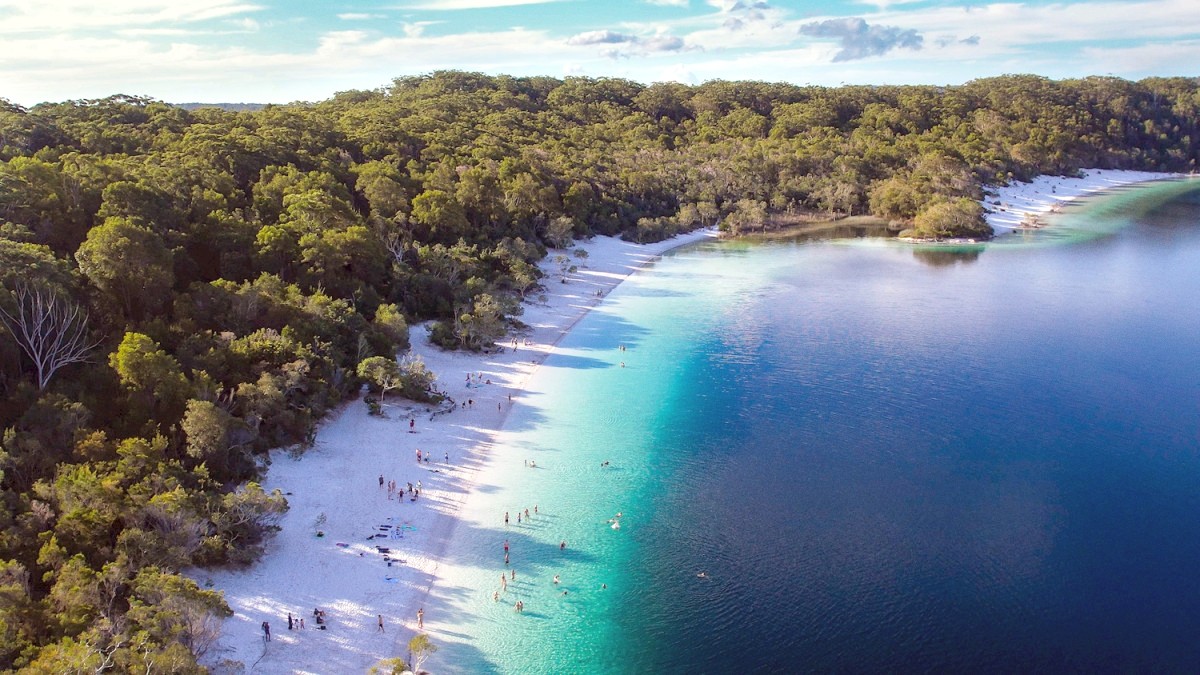
Queensland, Australia
Consider your tolerance for heat, crowds, and budget when making your decision. Each season offers an unique perspective on K'gari's beauty.
This period generally holds the lowest prices for accommodation and tours, outside of the Christmas and New Year period. There are fewer crowds, offering a more secluded experience for those who tolerate the heat.
High Season (Winter: June-August, also Australian School Holidays) features superb weather for exploring. Cooler, drier temperatures make hiking comfortable. Insect activity (mosquitoes, sandflies) is lower. This is the peak time for whale watching in nearby Hervey Bay (July-November). This popularity does mean higher prices for accommodation, tours, and 4WD rentals. The island experiences increased visitor numbers, meaning popular sites like Lake McKenzie can see crowds. Book services well in advance, sometimes months ahead.
Shoulder Season (Autumn: March-May; Spring: September-November) offers pleasant weather without the extreme heat and humidity of summer or the chill of winter evenings. Crowds are fewer than in high season, allowing a more relaxed experience at popular spots. Prices for accommodation and tours can offer better value. Water temperatures in the lakes are suitable for swimming. Early autumn carries a possibility of late summer storms. Spring sees a gradual increase in humidity as the season progresses toward summer. Low Season (Summer: December-February) allows more secluded experiences for those who tolerate the heat. High heat and humidity can lead to discomfort for outdoor activities. Higher rainfall can lead to track closures due to flash flooding. This period falls within the official tropical cyclone season, requiring monitoring of weather warnings. Insect activity (mosquitoes, sandflies) peaks in summer.
Stay informed about local conditions.
November to April. Monitor BOM Weather Warnings for heavy rainfall, strong winds, storm surges, ferry cancellations, island closures.
Dry periods (late winter, spring) bring bushfire risk. Heavy rainfall (summer) causes flash flooding, making tracks impassable. Check QPWS K'gari Alerts for fire bans, park closures, and track conditions.
Match your visit to your preferences.
Winter (June-August) offers comfortable temperatures and low humidity, making it the preferred time for long walks and extensive exploration.
Autumn and Spring (March-May, September-November) provide warmer water temperatures with less humidity than summer. Air temperatures are pleasant.
Experience the marine giants.
From July to November, humpback whales migrate through the Great Sandy Strait. Hervey Bay is a premier whale-watching destination.
Peak sightings typically occur from August to October. Plan your trip during this window if whale watching is a priority.
All non-Australian citizens need a visa to enter the country. The type of visa varies based on nationality, visit purpose, and stay duration. For eligible passport holders (mainly European countries), the EVisitor (subclass 651) holds no application charge and allows multiple stays of up to 3 months within a 12-month period. Applications are submitted online. For eligible passport holders (USA, Canada, Japan, Singapore), the Electronic Travel Authority (ETA, subclass 601) carries a service fee (approx. AUD$20) and also permits multiple stays of up to 3 months within a 12-month period. Applications are typically completed via the Australian ETA app on a Smartphone. For all other nationalities, a Visitor Visa (subclass 600) applies, with fees starting around AUD$190. Processing times vary. Applications are online. Consider VisaHQ for direct visa and passport services.
Possess a valid passport (6 months validity beyond stay), and a printout or digital copy of your visa grant notification. No general entry fee applies beyond the visa application. Upon arrival, strict biosecurity checks occur. Declare all food, plant material, and animal products. Clean all outdoor gear. Non-compliance results in immediate fines or confiscation.
Mandatory for all vehicles. Purchase online from Queensland Parks and Wildlife Service (QPWS) before travel (approx. AUD$57.55 for 1 month or less). Display clearly.
Mandatory for camping. Purchase online from QPWS (approx. AUD$7.25/person/night or AUD$29.00/family/night). Allocates a specific zone. Display prominently.
No specific health entry requirements for Australia. Routine vaccinations (MMR, tetanus, polio, flu) are generally suggested. Consult your doctor or travel health clinic for personalized advice.
QPWS rangers patrol K'gari. Have all permits clearly displayed to avoid fines.
Always check the Australian Department of Home Affairs website for the latest visa requirements specific to your nationality. Regulations can change.
These are estimated daily costs per person for a K'gari trip in 2023/2024. These ranges exclude international flights and assume you are already on the mainland.
| Category | Budget | Mid-Range | Luxury |
|---|---|---|---|
| Accommodation | $40-80 | $100-250 | $300-600+ |
| Food | $30-50 | $60-100 | $120-200+ |
| Transportation | $20-40 | $50-80 | $100-200+ |
| Activities/Permits | $10-20 | $30-60 | $80-150+ |
| Total Daily Estimate | $100-190 | $240-490 | $600-1150+ |
The island is a wilderness area with specific environmental challenges.
For all emergencies (Police, Fire, Ambulance) in Australia, Dial 000.
Queensland Parks and Wildlife Service (QPWS) K'gari Office: (07) 4127 9150 (non-emergency park inquiries, dingo incidents, park alerts).
Keep tour operator, 4WD rental, accommodation details handy. For lost passports or serious issues, contact your national embassy or consulate.